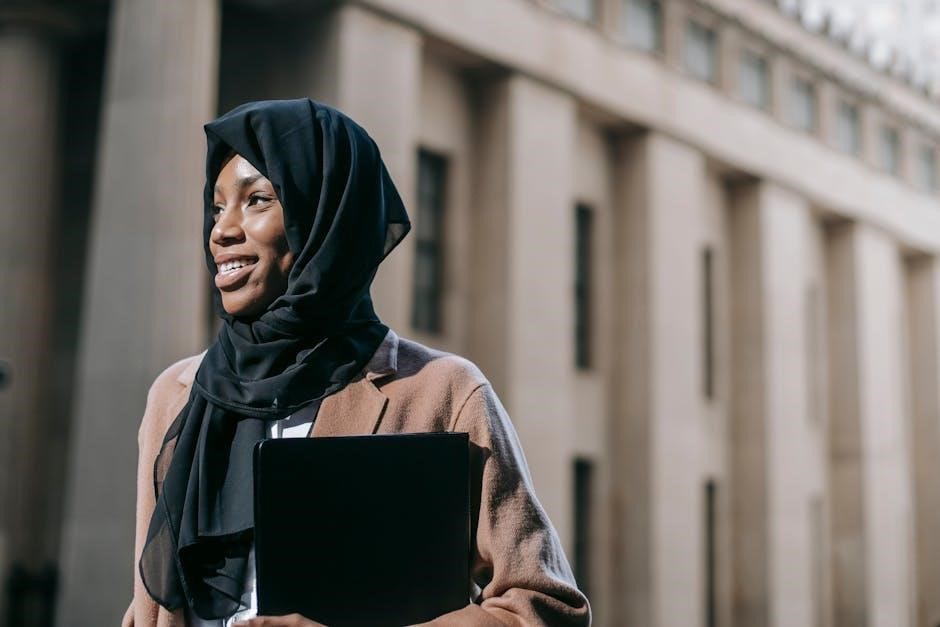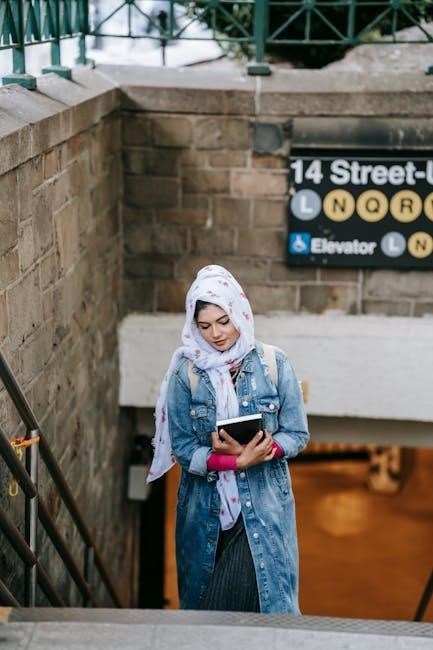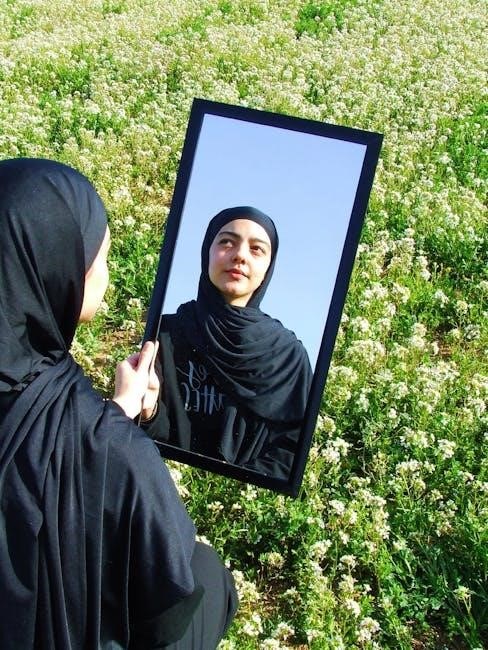Welcome to Islam! This guide helps new Muslims navigate their spiritual journey, offering resources on prayer, community, and mentorship. Embrace your faith with confidence and support.

Declaration of Faith (Shahada)

The Declaration of Faith, or Shahada, is the first pillar of Islam and the foundation of a Muslim’s belief. It is a profound statement that signifies one’s acceptance of Islam and commitment to its teachings. The Shahada is recited as follows: “Ashhadu an la ilaha illallah, wa ashhadu anna Muhammadan rasulullah” (I bear witness that there is no deity except Allah, and I bear witness that Muhammad is the Messenger of Allah). Reciting the Shahada with sincerity and understanding is essential, as it marks the official entry into Islam.
New Muslims are encouraged to recite the Shahada in the presence of witnesses, often at a mosque or Islamic center, to formally embrace their faith. This declaration is a pledge to submit to Allah’s will and to follow the guidance of Prophet Muhammad (peace be upon him). It is a moment of great spiritual significance, symbolizing a person’s transition to a life guided by Islamic principles. Seeking guidance from knowledgeable Muslims or Islamic resources can help new converts understand the depth and beauty of this declaration.
The Six Articles of Faith are the cornerstone of Islamic belief, outlining the fundamental principles that every Muslim must accept and uphold. These articles are derived from the Quran and the Sunnah, providing a clear framework for understanding the nature of existence and divine guidance. Belief in Allah: The first article emphasizes belief in the oneness of Allah, the Creator and Sustainer of the universe, who is unique in His attributes and unmatched in His authority. Belief in the Angels: Muslims believe in the existence of angels, who are Allah’s messengers and servants, fulfilling specific roles such as revelation and guidance. Understanding these articles helps new Muslims build a strong foundation of faith, enabling them to navigate their spiritual journey with clarity and confidence. Building a strong support system is crucial for new Muslims as they embark on their spiritual journey. Connecting with the Muslim community provides a sense of belonging and helps integrate Islamic practices into daily life. Attending local mosque events, joining Islamic centers, or participating in online forums can foster meaningful connections. Finding a knowledgeable mentor is equally vital. A mentor can guide you through complex questions, offer practical advice, and provide emotional support during your transition. Many communities offer mentorship programs specifically designed for new Muslims, ensuring a smooth and enriching experience. Additionally, engaging with experienced Muslims can help you navigate cultural and religious nuances, avoiding common pitfalls. Remember, seeking help and guidance is a sign of strength, not weakness. Embrace the opportunity to learn and grow within a supportive community, as this will strengthen your faith and deepen your understanding of Islam. Islam’s core practices form the foundation of a Muslim’s life, guiding spiritual growth and fostering a deep connection with Allah. These practices include the Five Daily Prayers, making ablution, and attending Friday Prayer, which are essential for maintaining devotion and structure. The Five Daily Prayers, known as Salah, are a cornerstone of Islam and a direct link to Allah. They are performed at specific times: Fajr (dawn), Dhuhr (noon), Asr (afternoon), Maghrib (sunset), and Isha (night). Each prayer consists of units called Rakah, which include recitation of the Quran, bowing, and prostration. Salah fosters spiritual growth, discipline, and mindfulness. For new Muslims, starting with shorter prayers and gradually increasing as comfort grows is recommended. Using English translations of prayers and apps like Namaz can aid learning. Consistency is key, as Allah values regularity over perfection. Salah is not just a ritual but a means to seek peace and guidance in daily life. Embrace it as a transformative practice that strengthens faith and connects you to the global Muslim community. Wudu is a sacred act of purification in Islam, essential before prayer, reciting the Quran, or other acts of worship. It involves washing specific parts of the body in a prescribed manner. Begin by washing your hands, then rinse your mouth, sniff water into your nose, wash your face, arms up to the elbows, wipe your head, and finally, wash your feet up to the ankles. Ensure all parts are clean and free from impurities. Wudu is not just physical cleansing but also a spiritual preparation, fostering mindfulness and humility. For new Muslims, practicing Wudu regularly helps establish a strong connection with Islamic rituals. Common mistakes include forgetting to wash all required areas or rushing through the process. Remember, Wudu is a moment to reflect and seek Allah’s blessings. Use visual guides or seek mentorship to perfect your technique and understand its significance. Friday Prayer, or Jumu’ah, holds a special place in Islam as a communal worship that strengthens faith and unity. It is obligatory for men to attend, replacing the noon prayer (Dhuhr). The prayer consists of a sermon (Khutbah) delivered by an Imam, followed by a congregational prayer. The sermon often includes teachings, reminders, and guidance from the Quran and Hadith. Jumu’ah is a time for spiritual rejuvenation, fostering a sense of community and shared purpose. Many Muslims also take this opportunity to recite the Quran, engage in supplications, or seek forgiveness. Attending Jumu’ah is a way to break from daily routines and reconnect with Allah. For new Muslims, participating in this congregational prayer is a powerful way to integrate into the Muslim community and deepen their understanding of Islamic practices. It is a blessed day, and many Muslims look forward to it as a highlight of their week. Adopting modesty, humility, and compassion defines an Islamic lifestyle. It emphasizes charity, kindness, and community involvement, fostering a balanced and righteous way of living according to divine guidance. Islamic dress code emphasizes modesty, requiring both men and women to cover their bodies respectfully. For women, this typically means wearing loose, non-transparent clothing that covers the body, such as a hijab and abaya. Men are encouraged to wear loose-fitting, knee-length garments and avoid revealing attire. Modesty extends beyond clothing to behavior and demeanor, promoting humility and dignity. This practice reflects submission to Allah and fosters a moral society. New Muslims should seek guidance to ensure their attire aligns with Islamic principles while maintaining cultural and personal identity. Remember, modesty is a form of worship, fostering inner peace and connection with Allah. Reciting the Quran is a powerful act of worship that connects Muslims to Allah. It brings spiritual growth, guidance, and peace. Start with short surahs, focusing on proper pronunciation and understanding. Use resources like apps or teachers for accurate recitation. Regular Quran reading strengthens faith, clarifies thoughts, and provides comfort. It’s recommended to recite daily, even if briefly, to nurture a lasting bond with Allah’s words. This practice is highly rewarded and enriches your spiritual journey. Charity, or Zakat, is one of Islam’s Five Pillars and a fundamental act of worship. It involves giving a portion of one’s wealth (typically 2.5%) to those in need, fostering compassion and equality. Zakat purifies the heart and wealth, reminding Muslims of their responsibility to society. It’s obligatory for those with sufficient assets and is distributed to specific groups, including the poor, needy, and those in debt. Regularly practicing Zakat strengthens faith, promotes fairness, and nurtures a sense of community. New Muslims are encouraged to learn about Zakat’s rules and beneficiaries to fulfill this duty effectively. This act not only benefits others but also brings spiritual growth and divine reward. Embrace Zakat as a meaningful way to connect with Allah and contribute to a just society.Understanding the Six Articles of Faith


Belief in the Holy Books: This includes belief in the Quran and previous scriptures like the Torah and the Gospel, all of which were revealed by Allah to guide humanity.
Belief in the Prophets: Muslims believe in all prophets sent by Allah, with Prophet Muhammad (peace be upon him) being the final and most complete guide for mankind.
Belief in the Day of Judgment: This article focuses on the belief in the Hereafter, where all individuals will be held accountable for their deeds and rewarded or punished accordingly.
Belief in Divine Decree: Muslims accept that everything happens according to Allah’s will and plan, trusting in His wisdom and justice. The Importance of Community and Mentorship


Core Islamic Practices
The Five Daily Prayers (Salah)

Making Ablution (Wudu)
Friday Prayer (Jumu’ah) and Its Significance

Islamic Lifestyle and Etiquette

Islamic Dress Code and Modesty
Reciting the Quran and Its Benefits
Charity (Zakat) and Its Role in Islam

Be First to Comment